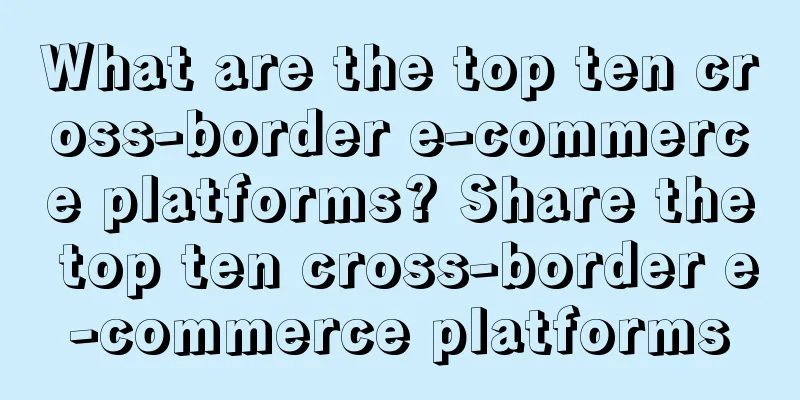What are the top ten cross-border e-commerce platforms? Share the top ten cross-border e-commerce platforms

|
The rapid development of cross-border e-commerce has allowed more and more people to see business opportunities and want to be on cross-border e-commerce platforms. However, there are so many cross-border e-commerce platforms, and it is important to choose one that suits you. So what are the top ten cross-border e-commerce platforms? Next, we will explain this aspect to you. 1. Amazon Amazon is an American cross-border e-commerce platform founded in 1995. Initially, it only operated online book sales business, but now it has expanded to a wide range of other products. It has become the online retailer with the most product varieties in the world and the world's second largest Internet company. 2. eBay eBay is an American cross-border e-commerce platform. It was founded in 1995 and is an online auction and shopping website that allows people around the world to buy and sell items online. Every day, millions of furniture, collectibles, computers, and vehicles are listed, sold, and sold on eBay. As long as the items do not violate the law or are on eBay's prohibited sales list, they can be listed and sold on eBay. 3. AliExpress AliExpress is an online foreign trade trading platform integrating orders, payments and logistics, which was created by Alibaba to help small and medium-sized enterprises reach end wholesalers and retailers, sell in small quantities and multiple batches quickly, and expand profit margins. 4. Tmall Global Tmall Global was officially launched by Alibaba Group on February 19, 2014. Tmall Global mainly provides overseas imported goods directly to domestic consumers. 5. Shopee Shopee was founded in 2015 and is the leading e-commerce platform in Southeast Asia and Taiwan. Its business covers seven markets including Singapore, Malaysia, the Philippines, Taiwan, Indonesia, Thailand and Vietnam. It also has offices in Shenzhen, Shanghai and Hong Kong. Its product categories include consumer electronics, home furnishings, beauty and health care, maternal and child products, clothing and fitness equipment. Currently, Shopee is recognized as the largest e-commerce platform in Southeast Asia! 6. Lazada Backed by German startup incubator RocketInternet and Samwer Brothers, Lazada targets users in Indonesia, Malaysia, the Philippines and Thailand. Lazada Group has been Alibaba Group’s flagship e-commerce platform in Southeast Asia since 2016. 7. Wish Wish is a mobile e-commerce shopping app. Designed and developed independently by ContextLogic in 2011, the platform provides personalized products through repeated calculations and analysis of consumer behavior and preferences. In 2018, Wish has supplied more than 200 million products to more than 350 million consumers worldwide, with more than 90 million monthly active users, 125,000 active merchants, and a peak daily shipment volume of 2 million orders, with orders mainly coming from the United States, Canada, Europe and other regions around the world. 8. SHEIN SheIn, Chinese name Xiyin, is an e-commerce application. It is a Chinese cross-border e-commerce giant. SHEIN is an international B2C fast fashion e-commerce company. It mainly deals in women's clothing, but also provides men's clothing, children's clothing, accessories, shoes, bags and other fashion products. Because SheIn focuses on the European and American markets and the founder team rarely shows up, SHEIN rarely appears in the public eye and media reports. 9. JD Global Shopping JD.COM Global Procurement was established in January 2014. Its business model is self-operated B2C plus non-pure platform, and its commodity import model is overseas direct mail plus bonded import. JD.COM has gradually opened corresponding special exhibition halls in various countries. Overseas procurement of JD.COM is also Haitao's main business direction in JD.COM. JD.COM has always attached great importance to product quality control and can only win the trust of consumers with the best products. 10. Alibaba International Station Alibaba International Station was established in 1999 and is the first business unit of Alibaba Group. Alibaba International Station has become the main platform for promoting the digitalization of foreign trade. It has served more than 26 million active corporate buyers in more than 200 countries and regions. It is one of the preferred online platforms for export companies to expand international trade by displaying and promoting suppliers' companies and products to overseas buyers and obtaining trade opportunities and orders. These are the top ten well-known cross-border e-commerce platforms. Each platform has its own advantages and characteristics. When choosing, you should consider the actual situation! Finally, I hope this article can help you! |
>>: Why doesn’t Amazon in the US use VAT? Which sites require VAT payment?
Recommend
What should I do if the entry requirements of Meikeduo are too high? What are the procedures?
Meikeduo is a new e-commerce platform, and many pe...
AI tools have not yet been used for short dramas
From Kuaishou's "KeLing" to Byte'...
Is Shopee commission-free in the first few months? What are the store opening policies?
Shopee now has sites in many countries around the ...
How does Lazada charge commission? Introduction to the charging standards
If you want to open a store on Lazada, you must fi...
With 10 trillion yuan in annual consumption, how can brands capture female users?
In recent years, the "she economy" has b...
The three top streamers were put on ice, and the paid knowledge circle was shaken
This article deeply analyzes the commercial IP phe...
What to do if there are no orders for new products on Amazon? Method introduction
Generally, new products on Amazon will have sales ...
Hebei Chemical Plant Becomes TikTok's Top Streamer. What Inspiration Does It Have for To B Enterprises Doing Short Video Marketing?
This article mainly discusses how Donghua Jinlong,...
Why does Lei Jun always sit at the top of the list of “Internet celebrity entrepreneurs”?
This article deeply analyzes how Lei Jun became a ...
How to transfer an Amazon store? What information is required for transferring an Amazon store?
In some cases, sellers may need to transfer their ...
How does shein create a hit product? What are the techniques for creating a hit product?
In today's era, the fashion industry is highly...
Which platform is better for Shopee cargo agency? How to choose?
When it comes to Shopee freight forwarding, many n...
Can I re-register if I failed to register with Shopee? What information do I need?
Now, whether it is domestic or foreign e-commerce,...
A thorough explanation of "new retail"
Many people have discussed the concept of new reta...
Moutai's Metaverse App is popular, but also criticized
Recently, the Metaverse has begun to enter the liv...









